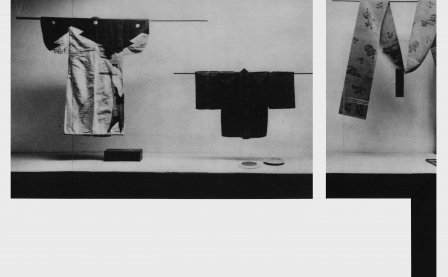“Staring out your car window, I feel my size.” The opening line from the Bellows’ single “Thick Skin” evokes a certain turn of feeling, an external bolt of stimulus that sits deep in the brain, a note both small and powerful. Reflecting on the topographical vastness of the “Hudson Palms” and “Catskill Gulf Stream,” singer Oliver Kalb for once feels his size, refracting visual externality for once inward, angled toward a larger proprioceptive arbitration between the in- and external. It’s the body for once made aware of its subjectivity, its size, shape, and transience flattened against the backdrop of the landscape, now frozen in awe of the seismic view. A common theme in art and literature, it’s a feeling that at least dates back to the theatric sublime of the Romantics, where poets and painters invoked the natural world as a heightened, awe-striking form to be celebrated. But more recently, it’s a turn of phrase that came to define the art-making practice of one staggeringly prolific Pacific Northwesterner who’s work leans in on the feeling, dramatizing the brittle transience in the face of something huge: Phil Elverum.
Throughout the years, Elverum’s output has been built on an attentive insight into this proprioception. The Microphones’ 2000 classic It Was Hot, We Stayed in the Water traced the icy silhouette of the Washington landscape, giving voice to the abstract forces of nature as the speaker’s human body merges with the transience of the wind and water. Later, tracks like “Headless Horseman” and “I Felt Your Shape” from 2001’s The Glow Pt. 2 followed the rise and fall of a lover’s chest as universal microcosm, grafting bodily motion over the perpetual entropy of natural forms like lava, wind, and snow. At the same time, Elverum builds these intricate walls of sound that suggest an attempt to rival this natural grandeur on its own terms. A paradox thus arises between his penchant for the soft motion of an awe-struck brilliance and the sprawling grandeur of his own noisy attempts to become the force itself. It’s in these contradictions that Elverum’s music stands strongest, mediating between the proprioceptive rawness surrounding the earthly insight of his perception and his own attempts to grasp out at some semblance of subliminal form.
With over a decade since the last Microphones release, these forms have since settled into the lexicon of lo-fi, with a number of bands and labels internalizing both the splendor and solitude of Elverum’s work. Double Double Whammy, the label formed by members of LVL UP and Trace Mountains have in many ways become the more prominent torch bearers for this affective turn of feeling, releasing albums that engage with this duality between heightened sensitivity and the noisy, colossal sublime. Acts like Florist, Told Slant, Eskimeaux, and Flashlight O have all flipped the idyllic unconventionality of Elverum’s influence into their own respective forms, dramatizing the almost metaphysical catharsis of feeling alive in one’s own body, touched by the entropy of the universe laid out before it. It makes perfect sense then that the third album from Bellows would be released on the label, where the act’s penchant for the small, light, and impermanent finds footing next to the sprawling arrangements and weighty splendor of a wealth of similar artists.
Like 2014’s Blue Breath, Fist & Palm splays out the crushing weight of existence across a vast expanse of natural metaphors, each at heart an attempt to capture this intertextual feeling, at once both small and steeped in latent potential. “Spring, Summer, Autumn, Winter” notes the grace and lightness of nude bodies ignited by the inability to traverse space and time to be close again. Against a fluttering, anxious undercurrent, Kalb whispers, “I can see that time has passed, I haven’t been myself.” With heavy use of auto-tune and multi-tracking, the single feels like a departure from the folky naturalism of Elverum and Stevens, opting for some intensive digital processing over folk’s typical sparseness. “O Joy” and “Dark Heart” skitter with similarly stiff MIDI programming, almost abandoning the effuse sensitivity behind a wall of mid-fi sludge. For an act built on wordy naturalism and the corporal body, it feels like a bit of a cop-out to rely so heavily on MIDI, but thankfully, Kalb’s songwriting carries the album to more heartfelt dimensions in stripped, tender moments. “Beauty” rolls with a plucked thunder of guitars, growing to massive heights with a thoughtful strings arrangement and heavy, harrowing breakdown, while “From Palms” grasps out at melodic timelessness.
Fist & Palm continues much of Bellows’ past adherence to lightness and subliminal brilliance, now with production that, though messy, feels like a closer approximation of intention. If self-actualization is a goal at all compatible with romantic universalism, then maybe Bellows is the phantom limb we’ve been waiting for, affirming again that our place, our time, lives on. From an orange juice at Palisades to our own agency and complicity in our “optimistically-defined” “universal naturalism,” Bellows reminds us that small parts have a potential greater than we realize. If only this capacity for brilliance could itself transcend the negative space, its absence synchronously heightened in mimesis.
More about: Bellows



